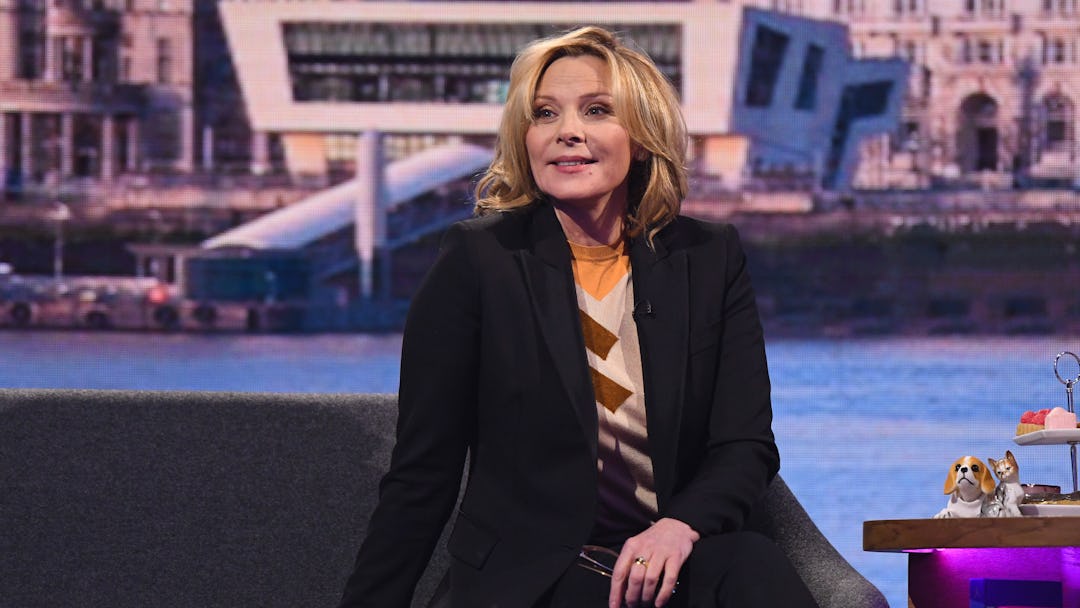At Flavorwire, we often pay attention to the new, but we make sure to do so not at the expense of what’s come before it. In “Seminal,” a bi-weekly column, we examine earlier, under-acknowledged exemplars of dramatic mastery from revered actors’ careers — moments that should be described as, dare I say, seminal. This week, it’s the perennially sensual Kim Cattrall’s work spreading I Can’t Believe It’s Not Butter on toast in a plea to get consumers to realize that “It’s Not Butter,” while deeply empathizing with their disbelief at that fact. Incidentally, among all that, she happens to hijack the male gaze.
Sure, you know her from Sex and the City as the rowdy, raunchy, Samantha Jones — that pioneer of PR and sexual liberation whose every utterance was a wink, who could make even devout Christians think about vehement anal by simply saying “car insurance.” In that series, Kim Cattrall’s character, a quintessential lipstick feminist, welcomed the male gaze and relished fitting into its boxes — but returned it with her own equally powerful, equally objectifying and stereotyping female gaze. People might forget it, but The Work didn’t end at Sex and the City. Soon after the series had finished airing, Cattrall took on her next crucial crusade for the unleashing of the female gaze, one that people do not credit her for nearly enough: this I Can’t Believe It’s Not Butter commercial. (Really, let’s call it what it is — a PSA for women everywhere, especially those with lactose intolerance, and especially in regions where there’s toast).
The plot of the empowering PSA follows an unnamed woman (but who needs a name when you have pizzazz?), played by Cattrall, as she explains her recipe for French toast. This is a woman who enjoys getting away from it all, a fact exhibited by her remote setting where the birds are always chirping and the Spanish guitar is always playing. The character is endowed with great nuance by the anonymous screenwriter, who decided to make her not only a bohemian deeply in touch with her senses — and those senses’ taste for butter substitute — but someone who also engages in normative behaviors, like preparing French toast, with a deeply feminist, lactose-free bent.
First, the self-assurance with which she begins listing off her recipe shows that she’s so confident she doesn’t even need to be possessive or covet her genius. Second, she has such a gleefully “fuck it” attitude that she doesn’t even need to speak real English. Note that she does not say “take toast” so much as “tay toast,” which means very little linguistically, but means a ton as far as character development and feminism are concerned.
And then, of course, we get to the subtle, insinuating twist: in case you didn’t catch it in the commercial, the “French” aspect of the toast has nothing to do with eggs or maple syrup. I hope you’re sitting down, because this is where a French adonis named Jacques saunters into the frame, with the PSA revealing that the unnamed woman’s actual recipe for French toast involves objectified men. “Oui,” says the near-nonverbal dildic Frenchman. “We like,” the unnamed woman replies, again radically twisting the confines of conversational English by a. withholding the object — which, incidentally, is Jacques. The patriarchy, this seems to suggest, is toast.
And that’s just what’s verbalized. There’s also a keen politicism to Cattrall’s physicality, and particularly the physicality displayed in the very central movement in the commercial: the biting of the toast that follows the spreading of the butter substitute. The bite is taken with an assertive, loud crunch, the kind that says, “Today I set out to inspire.” (I’ll bet whoever did sound mixing for the PSA likewise had their head in the right place, politically.) But of course any politically charged performance like this can seem simulated. Cattrall’s does not. Look at the little giggle that erupts following her first bite of toast; even with the urgency of the message at hand, Cattrall neither sacrifices authenticity nor humanity.
The most important “It’s your turn to sit down and listen, patriarchy” moment comes towards the end. A disembodied male voice — perhaps anonymized so as to display a problematized, universal masculinity — attempts to interrupt and mansplain I Can’t Believe It’s Not Butter to both the viewer and the unnamed woman, posturing with that mannish voice of his about how “there’s 70% less saturated fat and 30% fewer calories” — ya, thanks, we know, now stay in your lane.
And the beauty of it is that he gets overtaken by Cattrall; the frame suddenly cuts back to her, as though she bewitched the very camera with her self-affirmative seductions, as she says, “Now you can have it all.” And, sure, the PSA does end with another cut back to The Man, intoning the butter substitute’s name as though tone policing Cattrall, but I think that was a necessary gesture for the filmmaker to make — to say, yes, even for this woman who’s amazing at everything, including marketing vegetable oil spread, the patriarchy will still feel threatened and try to usurp her position. The Work is not done, the PSA emphasizes, alongside its emphasis on the lower calorie content of the butter substitute. You can have it all, but only when men learn how to shut up. Jacques is exemplar of this possibility, and Cattrall’s character’s chemistry with him as her sex slave and faux-butterer is a testament to manifold forms of progressive potential. I Can’t Believe It’s Not Butter is no manspread.
